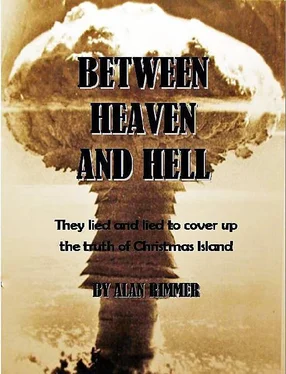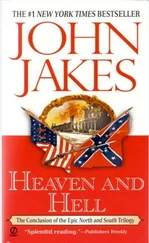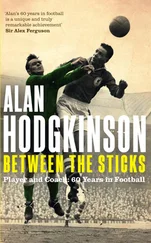Under normal circumstances, Lord Penney would have run a mile before agreeing to see McGinley who only that afternoon had been on TV accusing Penney and his political masters of “crimes against humanity”.
Unfortunately for Penney, the meetings were unavoidable. At aged 76, he had a condition not uncommon in gentlemen of advancing years: a weak bladder. This necessitated him visiting the toilet at frequent intervals and, to his obvious embarrassment, found his visits coincided with McGinley who, it seemed, had a bladder condition in synchronisation with his own.
Scientists like Penney had good reason to be careful about whom they met. Once feted and admired, they were now being treated like pariahs. The horrors of nuclear war had been brought into sharp focus by the veterans, and the public was baying for blood, especially in Britain which had a long tradition of nuclear antipathy.
Penney’s shoulders slumped whenever the slightly-built Scot appeared at his side; it was an ignominious position to be in for a man of his stature.
McGinley, who away from the microphones was a courteous man, was aware of his discomfiture. “I don’t mean to bother you Lord Penney,” he said during one visit. “I’m not doing this deliberately. It’s just that, well… if you’ve got to go, you’ve got to go.”
Lord Penney, a burly square-set individual, big around the beam and a heavy jaw, had been given a rough ride by the commission who seemed to be holding him personally responsible for all the sins of the nuclear bomb tests.
He was forced to answer some uncomfortable questions and admitted that at least one of the bomb tests had been far bigger than expected. Penney obviously loathed the experience.
Throughout all the pre-publicity, he had maintained a lofty silence, not wanting to add fuel to the debate, hoping all the brouhaha would eventually go away. He had never been known to give an interview about the bomb tests, and he usually avoided questions.
But on his ‘comfort breaks’ he could hardly avoid McGinley, and McGinley took full advantage: “I bombarded him with questions at every opportunity,” recalls McGinley.
“I knew I would never get another chance. I told him about the effects on some of the soldiers and how it had affected their lives. I told him about the widows left behind and the children that had been born deformed. I said it could not possibly be all coincidence.
“He listened carefully and looked distinctly uncomfortable. I don’t think anyone had spoken to him like that before. I remember him saying he was “sorry” for what had happened to the men, and that everything had been done to protect them.
“He gave me a copy of the statement he had made to the commission. As far as I was concerned it was full of inaccuracies, but I didn’t want to upset him, and his minder was ready to step in at the first opportunity.
“I believe he was sincere in what he was saying, but I also thought he was hiding something and I told him so. Penney just looked sad. That’s my last memory of him.”
McGinley couldn’t know it, but Penney was battling liver cancer to which he finally succumbed in 1991.
Some experts said it was ‘highly likely’ it was linked to his role in the atomic bomb tests. Some believed it was an apposite end to a life steeped in secrecy and suspicion.
His scientific achievements were monumental, but people like Ken McGinley found it hard to have any sympathy. “The fact is that people like Penney and his ilk destroyed thousands of lives, and I can’t really forgive him for that,” was McGinley’s only comment.
Lord Penney’s funeral took place in the village of East Hendred, 20 miles from Oxford, where he and his wife retired to in 1976.
He lived in some splendour in a substantial 17 thcentury cottage in Cat Street with white plaster walls, hand-hewn beams in the ceiling, manicured lawns and substantial of gardens.
As the “Father of Britain’s H-bomb” he had been showered with honours and took up several academic positions including Rector of Imperial College.
He remained shy and secretive to the end of his life and rarely talked about the atomic bomb tests that had brought him so much prestige and fame. But he was said to have retained a self-deprecating sense of humour, despite the horrors his work conjured up.
One example of this came at the height of his fame in 1958. Harold Macmillan invited him to a drinks party and asked him how many megaton bombs it would take to destroy Britain, to which Penney replied: “Five or six will knock us out, or to be on the safe side seven or eight,” adding with his characteristic grin: “I’ll ‘ave another gin and tonic, if you’d be so kind.”
His old Los Alamos colleague, Professor Michael Moore, believed that Penney never got over the death of his first wife. “I believe this is what drove him to achieve what he did,” he recalled.
“He had a naturally sunny disposition which changed after her death. Penney was always marked down for greatness and he never had any of the pangs of conscious about the use of the atomic bomb that most of the rest of us had.
“He was a British patriot through and through, even though I did hear talk that the Americans regarded him as ‘one of their own’ from the time he went to America to study in the early 1930s.
“Certainly he always went along with everything the Americans said. They trusted him because he was never tainted by any connection with the Communist cause prevalent in Cambridge and other universities at the time.
“They were particularly impressed that Penney had cut off all ties with Hyman Levy, his mathematics tutor at Imperial College, who was a well-known communist.
“Of all the British scientists, it was Penney that people like Leslie Groves, the director of the Manhattan Project, wanted most to work in America. But Penney would never leave the country he loved.”
Penney liked gardening, and could often be seen digging for potatoes in a small vegetable patch to the left of the house. Locals called him “Bill”, his wife was known as “Lady P” and they, as you might expect, were pillars of the community.
Before he died, he burned all his private papers and tellingly left a substantial sum in his will to build a play park for local children.
It was later officially opened by his wife Lady Eleanor Penney in memory of her husband. She walked down a footpath through a crowd of villagers and children to open the new Penney Play-park. She cut a ribbon across the gate and unveiled a plaque commemorating the opening. She told the local newspaper: “Bill loved children and always found them much easier company than their elders.”
The Australian Royal Commission left Britain with its tail between its legs. The “killer punch” that McClelland had cherished never materialised.
After all the windy rhetoric his commission had discovered that 30 badly-leaking drums of radio-active waste were dumped off the West Australian coast; one hundred aborigines walked barefoot over nuclear-contaminated ground because boots they had been given didn't fit; and a 1953 British nuclear test that allegedly caused a 'black mist' should not have been fired.
These were slim pickings for McClelland who was denied a triumphal return to Australia, and even less for McGinley and his veterans to get their teeth into. The Ministry of Defence appeared bomb-proof; there was no exposed flank to attack. Once again the veteran’s campaign began to sink in a sea of indifference.
Fate took a hand on April 26, 1986 at 1.23am Moscow time, when an explosion occurred in the No 4 unit of the Chernobyl nuclear power station 18km from the town of Chernobyl and 2km from the “company town” of Pripyat.
Читать дальше












